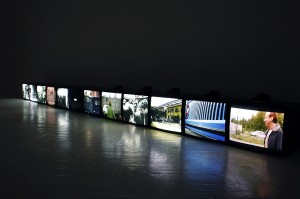In response to Nick Twemlow’s recent post on the Lumière and Company project and his comments on “constraint-based methods” of composition, I wanted to pose a foil -- or perhaps alternative -- to his conceptual poetry analogy. While projects based on constraint-based methods are certainly in vogue – from the Whitney to later this week at AWPalooza -- there is, it seems to me, an alternative possibility for a constraint-based response to the Lumière film: a response based on content. If you watch the Lumière original, it is about more than its 52-second length, in-camera editing, lack of synch-sound, and how many or how few takes; it is about workers… leaving… a factory.
How might restraints based not on method but based on content radically alter the Lumière and Company project? Imagine Wim Wenders at the coal mine in Shanxi province where underwater divers are attempting to rescue 153 miners who have been trapped since the mine flooded earlier this week? How might these workers eventually leave their factory? Imagine Spike Lee in Algeria where reports say as many as 500,000 public workers in 1,451 communes have gone on strike this week. These, too, are workers choosing to leave the “factories” that employ them. And perhaps we might even see a film in which the workers choose not to leave their factories, like those workers who occupied Republic Windows and Doors in Chicago in December 2008?
Those interested in this type of content-based restraint might turn to Harun Farocki’s Workers Leaving the Factory (1995), which jettisons 52-second non-synch-sound limits for the limit of, as he says in his essay in Senses of Cinema, “tracking down the theme of this film… in as many variants as possible.” Berlin, 1934. Detroit, 1926. Birmingham (UK), 1956. Here is a brief excerpt of Farocki’s film:
Farocki, "Workers Leaving the Factory"

Mark Nowak is the author of Revenants (Coffee House Press, 2000), Shut Up Shut Down (Coffee House Press...
Read Full Biography

